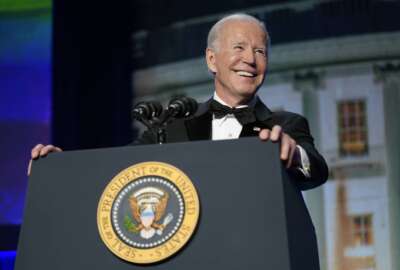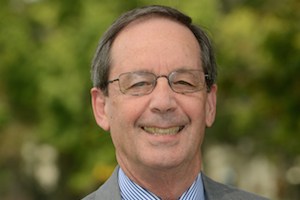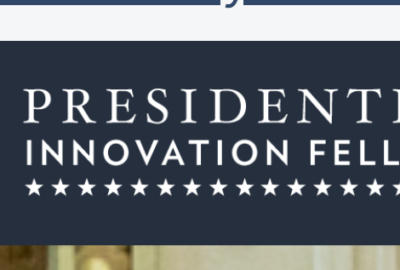Hubbard Radio Washington DC, LLC. All rights reserved. This website is not intended for users located within the European Economic Area.
GSA has a new person in charge of the Presidential Innovation Fellows program
You don't have to work decades for the federal government to have an impact. That's one idea behind the Presidential Innovation Fellows program, operated by the...
Best listening experience is on Chrome, Firefox or Safari. Subscribe to Federal Drive’s daily audio interviews on Apple Podcasts or PodcastOne.
You don’t have to work decades for the federal government to have an impact. That’s one idea behind the Presidential Innovation Fellows program, operated by the General Services Administration. Now the program has a new director. Rebeca Lamadrid joined the Federal Drive with Tom Temin.
Interview transcript:
Tom Temin: Ms. Lamadrid, good to have you on.
Rebeca Lamadrid: Thank you for having me, Tom.
Tom Temin: So tell us about this program. Review for us what a Presidential Innovation Fellow is, where they come from, how long they work, and so forth.
Rebeca Lamadrid: Absolutely. The Presidential Innovation Fellows Program is also known as PIF. And it was established by the White House Office of Science and Technology Policy in 2012. And our mission continues to be the same as it was a decade ago. Our goal is to embed industry’s brightest technologists, entrepreneurs and innovators within federal agencies to improve the way the government builds, designs and delivers its services for the public.
And this program has allowed us to introduce more than 200 top innovators into government. The result, we have improved public services for hundreds of millions of Americans. And these fellows are mid to senior career level leaders and they serve as advisors, or what we like to call entrepreneurs in residence, and they champion government modernization. They do this by working on building innovation capabilities, tackling really hard problems alongside talented and forward looking federal leaders. And today, as you mentioned, we build on that mission from within the Technology Transformation Services, an organization inside the General Services Administration.
Tom Temin: And do these people tend to be IT types of people? Or are they also business innovators, for example?
Rebeca Lamadrid: Great question. They actually come from multiple disciplines. Actually, when we recruit our fellows, we focus on five key areas. One of them is software and cloud infrastructure. Product management is another one, design and experience, data strategy and AI and digital transformation and strategy. So it’s not solely it focused.
Tom Temin: Because I heard one agency executive just the other day at a conference say he really prefers the term business digital transformation, as opposed to IT modernization, because IT is only the enabler. So is that part of the idea here?
Rebeca Lamadrid: That is certainly part of the idea. It is larger than IT, it is about the modernisation of technologies. And it is also focused on people. And it’s that this innovators that have all this different types of experiences can come and do this important work in federal government.
Tom Temin: And they can stay for one year or two years in general?
Rebeca Lamadrid: Correct. We recruit them for a 12 month commitment. And they can stay longer than that. But we start with 12 years — 12 months.
Tom Temin: 12 months. Well, I guess they could apply for a permanent job and then stay for a long time. Do any of them ever do that, by the way?
Rebeca Lamadrid: They actually do. Some fellows have stayed in government, we have some of them that have become the, for example, the chief technology officer at the VA (Department of Veterans Affairs) or the chief data officer at the Department of Commerce, just to name a few, also the chief of people and culture at FDA (Food and Drug Administration), so they do stay. But the program is not necessarily designed for that. But because they build, you know, these really strong networks and gain really in depth understanding of how the federal government works, they are really set up to become really strong candidates for more permanent jobs.
Tom Temin: And how many openings are there for fellows at a given time?
Rebeca Lamadrid: For this upcoming recruiting cycle, we are looking to recruit 30 to 35 fellows.
Tom Temin: All right, we’re speaking with Rebeca Lamadrid. She is the new director of the Presidential Innovation Fellows Program, which is operated by the General Services Administration, and talk about the process for you say recruiting. How do people find out about this program? What does it take to become a fellow?
Rebeca Lamadrid: Getting to become a fellow, we take that effort in a two pronged approach. So on one side, we recruit really bright and talented individuals. And we also on another side, source challenges by actively listening to agencies and identify where these fellows can truly make a difference. When we recruit the fellows, it’s a quite rigorous process and many of the fellows we select have applied several years before even getting selected. It’s really competitive. We receive over 1,000 applications every recruiting cycle. Another thing that is important for me to point out to you, Tom, is that our processes have a strong focus on diversity, equity, inclusion and accessibility, aligning to the administration’s priorities. An example of how this plays out is that we, for example, blind resumes before sending them to agencies, we also make questions available ahead of time. So the interviews are not only about being a great interviewer, but instead we want to truly identify subject matter experts. Another idea of our DEIA efforts is that we target outreach to underrepresented communities. And that helps us ensure that we’re bringing in talent that represents the American public. We open recruitment for fellows every year. And this year, applications are open for mid-May, and they go all the way through the end of June. And while we’re doing all of that, on the fellow recruitment side, on the agency side, we’re also actively working to source and define opportunities for fellows to truly make an impact.
Tom Temin: Do you ever go to companies and say, hey, we’ve got these opportunities? Do you know anyone that’s really smart in your company that might want to apply?
Rebeca Lamadrid: You know, more than going to companies, we go to communities, we, of course, talk to alumni, and certainly tag into people that we know and even make efforts to be in front of, as I mentioned, these communities where we can source the talent.
Tom Temin: And let me ask you this too, because GSA operates its own kind of innovative in house group called 18F. And then there’s the U.S. Digital Service. And U.S. Digital Service itself is replicated in a lot of the large agencies, I think, in DoD (Department of Defense) and VA come to mind, how do the fellows interact with those structures? Which could be employees coming from a different vector or even permanent employees?
Rebeca Lamadrid: Fantastic question, Tom. All of these interactions allow for these programs and groups to create a community of innovation that is, you know, across government, and they get to share best practices. And, you know, not necessarily reinvent the wheel. You know, there’s a lot of sharing and forming of this community that is really fantastic within government.
Tom Temin: All right, and how did you get to this spot? You are fairly new to GSA yourself? Correct?
Rebeca Lamadrid: That is right. I’m new, I am seven weeks in. And I couldn’t be more excited to be leading this program. I come to this position from the nonprofit world where I have more than 15 years of experience in program management, talent development, and I’ve spent a number of years as an executive leader.
Tom Temin: So what’s it like on the inside?
Rebeca Lamadrid: It is different, I must say, quite complex, but at the same time, fascinating. The group of people that I get to spend my days with are really committed public servants. And it’s truly an honor to be part of this fantastic mission.
Tom Temin: Rebeca Lamadrid is director of the Presidential Innovation Fellows Program at the General Services Administration. Thanks so much for joining me.
Rebeca Lamadrid: Thank you so much for having me, Tom.
Copyright © 2024 Federal News Network. All rights reserved. This website is not intended for users located within the European Economic Area.
Tom Temin
Tom Temin is host of the Federal Drive and has been providing insight on federal technology and management issues for more than 30 years.
Follow @tteminWFED





